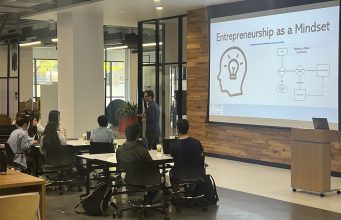Artificial intelligence (AI) and machine learning have become critical business tools that are changing the way companies operate internally, as well as how they interact with consumers. This is a powerful technology that can provide an edge to any business that integrates AI and machine learning into its business systems.
In fact, according to a recent Statista report, 84 percent of global businesses will adopt AI technology, as they believe it will provide them with a competitive advantage over rival companies.
While there are countless applications for AI in a variety of business contexts, the role of personalized recommendations and some of the unexpected consequences it has on consumer behavior is currently a hot topic of discussion.
How Personalized Recommendations Shape Consumer Preferences
In a recent Business Over Breakfast episode, Jesse Bockstedt, professor of Information Systems & Operations Management, shared insights on how personalization systems and online recommendations can impact consumer behavior by influencing their preferences and economic decisions.

Bockstedt researches user behavior and economic issues in the context of information technology, internet business models, and AI & machine learning. His research has appeared in multiple leading academic journals, and he is currently working on people’s preferences in working with AI vs. human experts in judgment tasks.
“Most content and most e-commerce sites that you interact with online have some form of a recommender system that is trying to create a personalized experience for you to help you navigate the overwhelming amount of information on the internet,” Bockstedt shares.
Recommender systems, which is a technology built on machine learning, are used quite extensively in online commerce, and their output—recommendations that they produce for consumers—actually have some unintended consequences on consumer behavior.
Jesse Bockstedt, professor of Information Systems & Operations Management
Bockstedt warns that the simple fact that recommender systems provide a prediction and personalized ratings for users actually changes how they perceive the content or product they consume, which can bias their rating after the fact. For example, a movie that comes as “highly recommended” can influence people to leave a rating that is artificially higher than if they had watched the movie with no previous information.
Do Hyper Personalized Marketing Approaches Build or Destroy Trust?
The inherent bias created by recommender systems is one of the greatest challenges to building and maintaining an effective system for users. Bias gradually contaminates the inputs to a recommender system, which ultimately weakens its ability to provide high-quality recommendations in subsequent iterations.
Inaccuracy from biased inputs, distorted views that lean toward system preferences, and vulnerability to user manipulation from intentional or unintentional positive or negative reviews by users, erodes consumer trust over time, particularly when there is a clear dissonance between pre-consumption and post-consumption ratings.
“If you think about the potential impact of recommender systems and personalization systems on customer behavior, even if they are small impacts, at the scale at which most of these e-commerce companies operate, they can have huge, overall impacts on the bottom line, trust, and other factors,” Bockstedt says.
Fundamentally, the challenge we are trying to address through this line of research is the paradoxical relationship between the system’s pre-consumptions usefulness and the system’s post-consumption bias.
Bockstedt’s research aims to uncover mitigation strategies for bias or ‘preference pollution’ in recommender systems. While there are a lot of exciting areas for research against this challenge, Bockstedt has identified a few mitigation strategies that can prevent bias and improve the efficacy of recommender systems, which include how ratings are designed and how recommendations are displayed to users.

Learn More About AI & Machine Learning
If you are interested in learning more about how AI & machine learning can influence consumers, as well as the businesses that deploy them, Emory Executive Education offers a course led by industry-leading professor, Jesse Bockstedt.
The AI & Machine Learning for Business course is ideal for leaders, managers, strategic decision-makers, and small teams that want to remain competitive in the digital economy and fully understand these transformational technologies. This business course will build your foundational understanding of these concepts in a non-technical, highly-interactive format, exploring existing and emerging developments of machine learning in data science, predictive modeling, and artificial intelligence, and how it is changing the way we work.
The next delivery of this in-person course is August 22 – 23, 2022 from 8:30 a.m. to 4:30 p.m. each day. Register now as spots are limited, and the course is expected to fill quickly.











